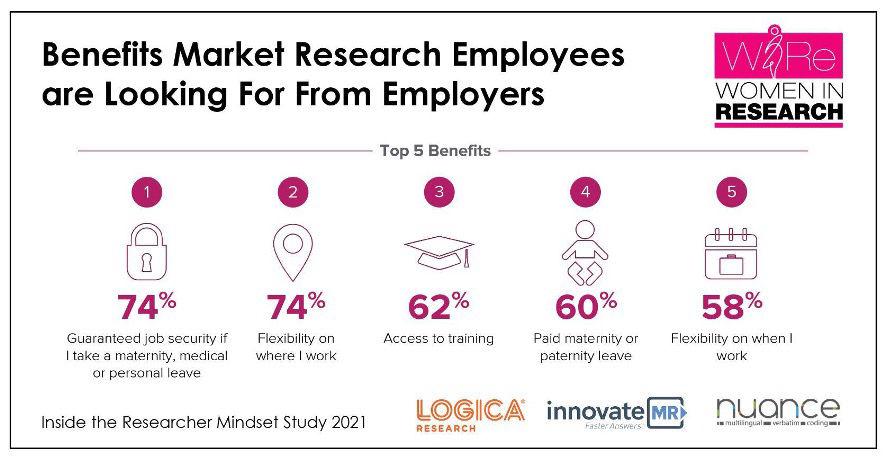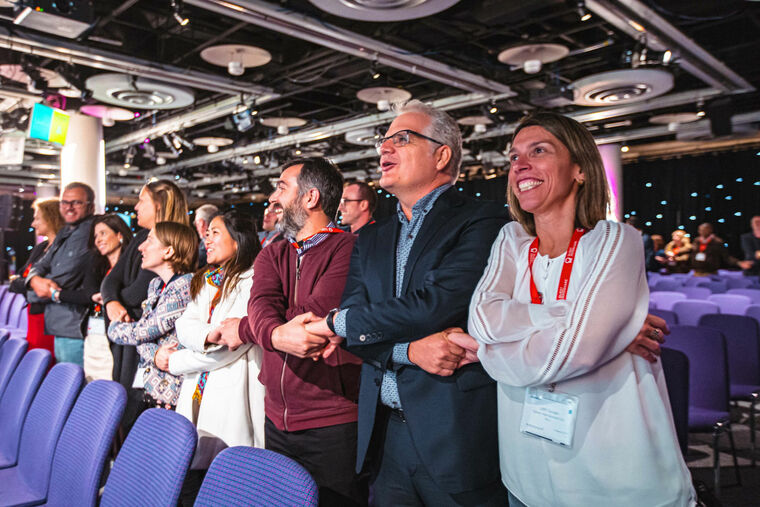The state of women in the #MRX workplace
Together we can make a positive impact in 2022. Here’s to the future of women!

There is no doubt the world has shifted dramatically over the past two years, and especially for women. As we celebrate International Women’s Day, Women in Research (WIRe) want to acknowledge the exceptional impact the pandemic has had on the ability of many women in the market research industry to stay in the workforce and what that means for the future of research.
COVID, without a doubt, has had a disproportionately negative impact on women, their careers and their lives as a whole. The changes wrought both on women and on the market research industry employment landscape as a whole are significant, and we will all be working to understand both the short-term and long-term consequences for some time to come.
COVID-19 impact on women and gender equality
The pandemic instantly created a huge gender divide, more than what already existed and one that may take years upon years to repair. It is disheartening to see what appears to be a reversal of progress toward gender equality, with an Institute for Health Metrics and Evaluation at the University of Washington study containing datasets from 193 countries that shows “in every part of the world, women experienced higher rates of employment loss than men since the start of the pandemic.” And the American Psychological Association recently reported that millions of women who have left the workforce (due to the insufficient economic, societal and community infrastructure to support them during this time) may not return anytime soon.
According to the 2020 Women in the Workplace study, co-authored by McKinsey and LeanIn.org, 1 in 4 women have now either left the workplace or downshifted their careers due to the COVID pandemic. On a global level, the loss of women from the workforce has major negative implications. The McKinsey Global Institute has estimated that global GDP growth could be $1 trillion lower in 2030 than it would be if women’s unemployment simply tracked that of men in each sector. If these trends are left unaddressed, they will exacerbate existing inequalities and reverse decades of progress toward an inclusive economy for women and people of colour.
A key reason cited across the board for women leaving the workforce is to care for someone else - whether it be children, ageing parents, other relatives—or just the demands of unpaid domestic labour. Our study conducted with WIRe partners shortly after the pandemic began, “Impact of COVID-19 on American Workers,” showed that when working women in the U.S. with school-aged children were suddenly met with school closures in 2020, 44% said it negatively impacted their ability to work.
Women are truly on the front lines here; they do an average of 75% of the world’s total unpaid-care work, the demands of which have grown substantially during the pandemic, including childcare, caring for the elderly, cooking, and cleaning. 40% of mothers (compared to 27% of fathers) have added three or more additional hours of caregiving a day to their schedule. That is 15 or more hours a week, the equivalent of a considerable part-time job. In some regions, such as South Asia and the Middle East and North Africa, women’s share of unpaid care work is as high as 80 to 90%.
What MRX employers need to know
The psychological and existential impact of COVID was examined in another study WIRe conducted with partners in 2021, Inside the Researcher Mindset. While most of the data shared was applicable to the research industry as a whole without gender breakdown, market research employers should take note of some of the themes highlighted below if they want to attract women back to the workforce and retain them.
Employees are looking for job security even if leave needs to be taken (74%), flexibility for remote work (74%), access to training (62%), paid maternity/paternity leave (60%), and flexibility around working hours (58%). In a time when many market research firms are struggling to fill open positions and retain employees, it may be time to take a close look at how your company is meeting these most desired employee benefits.

Silver linings?
It’s not all bad news. Our research shows that the pandemic has initiated some positive changes among employers, with companies citing a greater awareness of the value of a diverse workforce (33%), increases in remote work acceptance (78%), development of greater empathy as a company (21%), and understanding the importance of flexibility around childcare and school commitments (25%). This indicates that moving forward, we may see flexible schedules, work from home and other benefits specifically geared to make a “remote first” environment more prevalent within the industry.
What you can do to help
This year marks WIRe’s 15th Anniversary, and the third wave of our WIRe Career and Gender Advancement Study will kick off next quarter. While the last wave of our study (conducted every five years with Material) showed a significant lift in gender equality in our industry, the current challenges that women are facing may skew our progression in a displeasing direction. You can stay updated on the findings of our study by signing up on our website to get our latest news.
The statistics referenced earlier in this article may make many of us feel helpless. Or even hopeless. But there are many ways employers and executive teams can make a meaningful difference toward reversing the impact of the pandemic on women.
Ensure women's representation and inclusion is in all planning and decision making in your company.
Support working parents, keeping in mind that the majority of unpaid care work falls to women and remembering that programs like work flexibility and paid maternity/paternity leave that benefit women ALSO benefit men.
And lastly, support women and women-owned businesses across the value chain and in the communities where you live.
Together we can make a positive impact in 2022. Here’s to the future of women!


